The Golden West
Brief Synopsis
Cast & Crew
David Howard
George O'brien
Janet Chandler
Marion Burns
Arthur Pierson
Onslow Stevens
Film Details
Technical Specs

Synopsis
In Kentucky, in 1847, David Lynch and Betty Summers, whose families are engaged in a feud, return from school after having met and fallen in love on the train. At a masked ball given in Betty's honor, she refuses to dance with Calvin Brown, a rising young engineer from Richmond, whom her family wants her to marry, and instead dances with someone whom no one knows. After her drunken brother Robert pulls off the mask of her partner, Colonel Horace Summers, Betty's father, is extremely upset to find Dave, a Lynch, in his house. Robert slaps Dave, who challenges him to a duel when he sobers up. Insulted, Robert shoots at Dave and wounds him in the arm. Dave tries to take the gun away, but as they struggle, the gun goes off and kills Robert. Dave escapes on horseback and then doubles back and climbs up to Betty's window to say goodbye. He tells her that he may go West and agrees to send for her. The next morning, Dennis Epstein, a Jewish traveling merchant from Ireland, sees Dave about to fall off his horse. He hides him from Calvin and the colonel and tends to his wounds. They travel West together and join a wagon train to sell Dennis' wares. During a buffalo hunt, when the animals stampede, Dave rescues Helen Sheppard, an orphan traveling in the train. Colonel Summers and his party catch up with Dave, and the colonel challenges Dave to a duel. Dave does not shoot, and he is hit. After the colonel and the others ride off, Helen tends to Dave, and when they reach Fort Henry, Wyoming, the last outpost East of the Rockies, she remains to care for him. They marry and have a son named Davy. On Davy's birthday, Dennis arrives with a present, a music box from Switzerland, and Dave is affected as he associates its tune with Betty. Dennis relates that Betty, who married Calvin when she thought Dave had died, now has a cute daughter. During an Indian raid, Helen is killed, while Dave and the baby are captured. Twenty years later, the builders of the Union Pacific Railroad are harassed by Indians led by a mysterious white chief, Motano. The Indians conduct their attacks because they fear the railroad will bring more white men who will drive them out. Betty Brown, the daughter of Betty and Calvin, is in Wyoming with her father, now the chief engineer of the railroad. When Indians capture the stage Betty and Dennis are on, Motano rides up and takes her onto his horse. Dennis recognizes him as Dave Lynch's son. The Indians offer to return Betty if the work on the railroad will stop, but Calvin refuses. After a marriage ceremony, Motano takes Betty to his tepee, and in the morning, she tries to stab him, but he stops her. When Motano does not attack the railroad workers, his rival, Black Wolf, plans an attack and sends for all the mountain tribes to wage a war. Meanwhile, Motano gives Betty the music box, saying that it is the only thing he has always loved. She recognizes the tune as one her mother used to sing. When she asks to be taken to her father, Motano agrees. Black Wolf and the others chase them to the railroad, where the battle begins. Motano joins the whites as the Indians encircle the train. When Black Wolf is about to get Betty, Motano fights him. Black Wolf is then shot with an arrow, and the Indians are driven off. Calvin accepts his daughter's newfound love for Motano, and the couple embraces.

Director
David Howard
Cast

George O'brien
Janet Chandler
Marion Burns

Arthur Pierson

Onslow Stevens
Emmett Corrigan
Bert Hanlon

Edmund Breese
Julia Swayne Gordon
Dorothy Ward

Hattie Mcdaniel
Sam Adams
Eddie Dillon
George Rigas
Crew
David Cox
Duncan Cramer
Ralph Dietrich
Curtis Fetters
Bernard Freericks
James Gordon
James F. Hanley
Lou Kunkel
Arthur Lange
Bert Lynch
Cliff Lyons
Sidney D. Mitchell
Gordon Rigby
Ad Schaumer
George Schneiderman

Film Details
Technical Specs

Quotes
Trivia
Notes
The opening title card of this film reads, "Zane Grey's The Golden West." According to information in the Twentieth Century-Fox Records of the Legal Department, author Zane Grey signed a contract with Fox to allow them to release a film based on the novel The Last Trail, which would not refer to the novel's title, but instead state that the film was "from an original story by Zane Grey." Motion Picture Herald speculates that "there are shots which appear to be from other big Fox pictures"; Harrrison's Reports notes, "The scenes showing the settlers fighting off the Indians from a railroad train have been mixed with some scenes from an old picture." According to a Film Daily news item, at the completion of shooting, George O'Brien presented cowboy hats to the members of the film unit. Fox earlier produced two films based on the same source, both of which were entitled The Last Trail: in 1921, directed by Emmett J. Flynn and starring Maurice B. Flynn; and in 1927, directed by Lewis Seiler and starring Tom Mix (see AFI Catalog of Feature Films, 1921-30; F2.2985 and F2.2986). In 1933, Fox produced another film based on the same source entitled The Last Trail (see AFI Catalog of Feature Films, 1931-40; F3.2395), also starring George O'Brien and directed by James Tinling.












